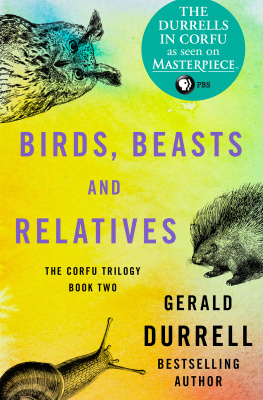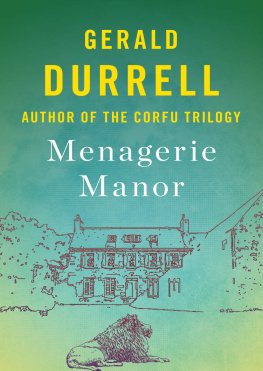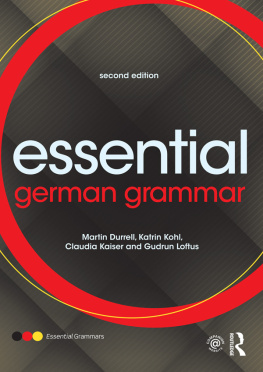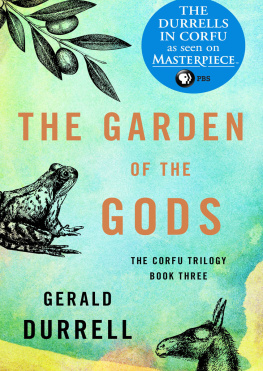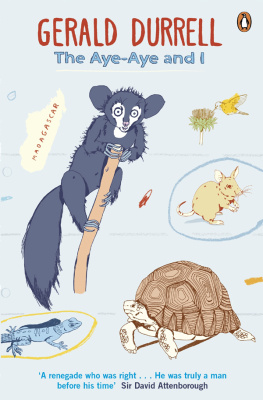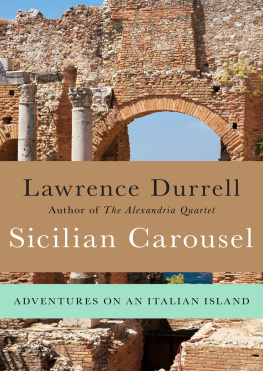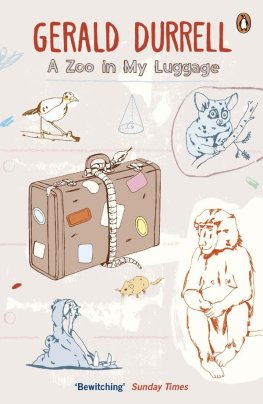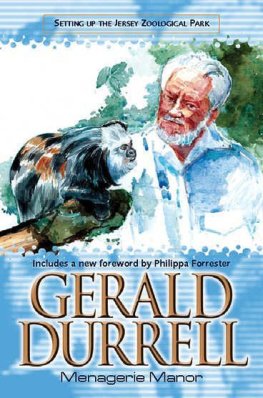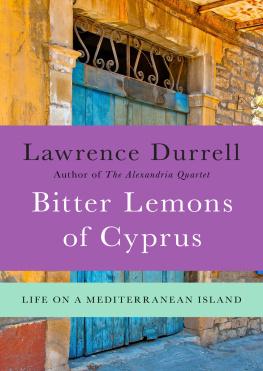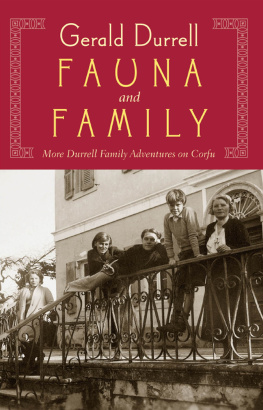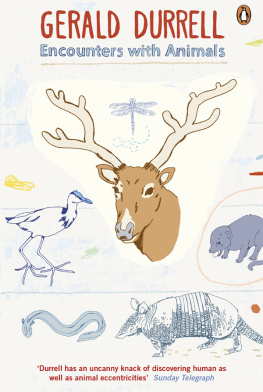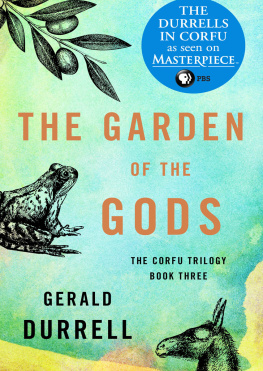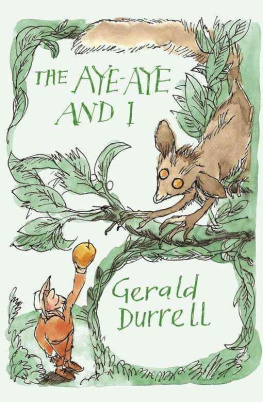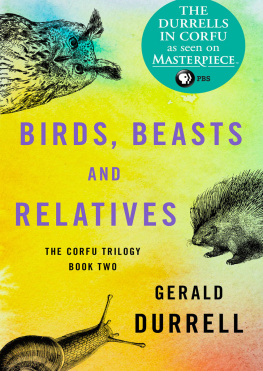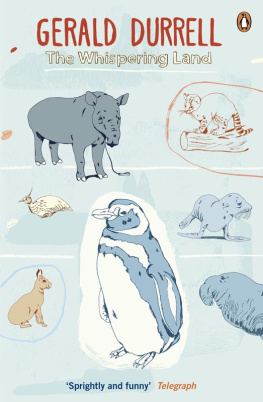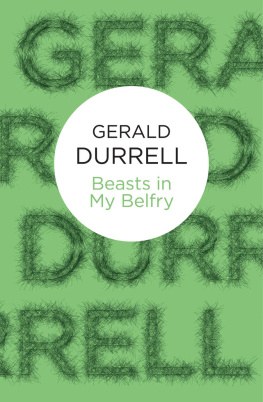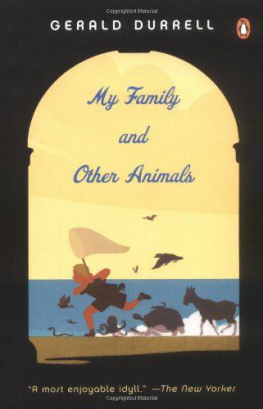Birds, Beasts and Relatives
The Corfu Trilogy, Book Two
Gerald Durrell

To Theodore Stephanides,
in gratitude for laughter and for learning
Contents
PART ONE
Perama
Here great trees cool-shaded grow, pear, pomegranate, rich apple, honey-sweet fig and blossoming olive, forever bearing fruit, winter and summer never stripped, but everblowing the western wind brings fruit to birth and ripens others. Pear follows pear, apple after apple grows, fig after fig, and grape yields grape again.
H OMER
PART TWO
Kontokali
Hospitality is, indeed, now no less than in classical times, a sacred duty in these islands, and it is a duty most conscientiously performed.
P ROFESSOR A NSTEAD
Interlude for Spirits
What seest thou else in the dark backward and abysm of time?
S HAKESPEARE , The Tempest
PART THREE
Criseda
This place is wonderfully lovely. I wish you could see it; if you came I could put you up beautifully, and feed you on ginger-beer and claret and prawns and figs.
E DWARD L EAR
The Christening
The island lies off the Albanian and Greek coast-lines like a long, rust-eroded scimitar. The hilt of the scimitar is the mountain region of the island, for the most part barren and stony, with towering rock cliffs haunted by blue rock-thrushes and peregrine falcons. In the valleys in this mountain region, however, where water gushes plentifully from the red-and-gold rocks, you get forests of almond and walnut trees, casting shade as cool as a well, thick battalions of spear-like cypress and silver-trunked fig trees with leaves as large as a salver. The blade of the scimitar is made up of rolling greeny-silver eiderdowns of giant olive trees, some reputedly over five hundred years old and each one unique in its hunched, arthritic shape, its trunk pitted with a hundred holes like pumice-stone. Towards the tip of the blade you have Lefkimi, with its twinkling, eye-aching sand dunes and great salt marshes, decorated with acres of bamboos that creak and rustle and whisper to each other surreptitiously. The island is called Corfu.
That August, when we arrived, the island lay breathless and sun-drugged in a smouldering, peacock-blue sea under a sky that had been faded to a pale powder-blue by the fierce rays of the sun. Our reasons for packing up and leaving the gloomy shores of England were somewhat nebulous, but based loosely on the fact that we were tired of the drab suburbanness of life in England and its accompanying bleak and unpleasant climate. So we had fled to Corfu, hoping that the sunshine of Greece would cure us of the mental and physical inertia which so long a sojourn in England had brought about. Very soon after we had landed, we had acquired our first villa and our first friend on the island.
The friend was Spiro, a waddling, barrel-shaped man with huge powerful hands and a brown, leathery, scowling face. He had perfected an odd but adequate command over English and he possessed an ancient Dodge which he used as a taxi. We soon found that Spiro, like most of the Corfu characters, was unique. There seemed to be no one that he did not know and nothing that he could not obtain or get done for you. Even the most bizarre requests from the family would be met by him with the remark, Donts yous worries about thats. Ill fixes thats. And fix it he would. His first major piece of fixing was the acquisition of our villa, for Mother had been insistent that we must have a bathroom, and this very necessary adjunct of wholesome living was in short supply in Corfu. But, needless to say, Spiro knew of a villa with a bath, and very soon, after much shouting and roaring, gesticulation, sweating, and waddling to and fro carrying armfuls of our goods and chattels, Spiro had us safely installed. From that moment he ceased to be merely a taxi driver that we hired and became our guide, philosopher, and friend.
The villa that Spiro had found was shaped not unlike a brick and was a bright crushed-strawberry pink with green shutters. It crouched in a cathedral-like grove of olives that sloped down the hillside to the sea, and it was surrounded by a pocket-handkerchief-size garden, the flower-beds laid out with a geometrical accuracy so dear to the Victorians, and the whole thing guarded by a tall, thick hedge of fuchsias that rustled mysteriously with birds. Coming, as we had done, from a number of years torture in the cold grey of England, the sunshine and the brilliant colours and scents it evoked acted on us all like a heady draught of wine.
It affected each member of the family in a different way. Larry wandered about in a sort of daze, periodically quoting long stanzas of poetry to Mother, who either did not listen or else said, Very nice, dear, absently. She, entranced by the variety of fruit and vegetables available, spent most of her time closeted in the kitchen preparing complicated and delicious menus for every meal. Margo, convinced that the sunshine would do for her acne what all the pills and potions of the medical profession had so far failed to do, sun-bathed with strenuous earnestness in the olive groves and in consequence got herself badly burned. Leslie discovered, to his delight, that one could purchase lethal weapons without a permit in Greece and so he kept disappearing into town and reappearing carrying a variety of fowling pieces ranging from ancient Turkish muzzle-loaders to revolvers and shot guns. As he insisted on practising with each new acquisition, our nerves became somewhat frayed, and as Larry remarked somewhat bitterly, it was rather like living in a villa surrounded by revolutionary forces.
The garden, for long untended, was an overgrown riot of uninhibited flowers and weeds in which whirled, squeaked, rustled, and jumped a multi-coloured merry-go-round of insect life, and so it was the garden that held my immediate attention.
However luxurious our various gardens had been in England, they had never provided me with such an assortment of living creatures. I found myself prey to the most curious sensation of unreality. It was rather like being born for the first time. In that brilliant, brittle light I could appreciate the true huntsmans-red of a lady-birds wing case, the magnificent chocolate and amber of an earwig, and the deep shining agate of the ants. Then I could feast my eyes on a bewildering number of creatures unfamiliar to me: the great, furry carpenter-bees, which prowled like electric-blue teddy bears, humming to themselves, from flower to flower; the sulphur-yellow, black-striped swallow-tailed butterflies, with their elegant cut-away coats, that pirouetted up and down the fuchsia hedge doing complicated minuets with each other; and the humming-bird hawk-moths that hung, stationary, suspended by a blur of wings, in front of the flowers, while they probed each bloom with their long, delicate proboscises.
I was exceedingly ignorant as to even the simplest facts about these creatures and I had no books to guide me. All I could do was to watch them as they went about their business in the garden or capture them so that I could study them more carefully at first hand. Very soon my bedroom was filled with a battalion of jam jars and biscuit tins containing the prizes that I had found in our tiny garden. These had to be smuggled surreptitiously into the house, for the family, with the possible exception of Mother, viewed the introduction of this fauna into the villa with considerable alarm.
Each brilliant day brought some new puzzles of behaviour to underline my ignorance. One of the creatures that intrigued and irritated me most was the dung-beetle. I would lie on my stomach with Roger, my dog, squatting like a mountain of black curls, panting, by my side, watching two shiny black dung-beetles, each with a delicately curved rhino horn on its head, rolling between them (with immense dedication) a beautifully shaped ball of cow dung. To begin with I wanted to know how they managed to make the ball so completely and beautifully round. I knew from my own experiments with clay and Plasticine that it was extremely difficult to get a completely round ball, however hard you rubbed and manipulated the material, yet the dung-beetles, with only their spiky legs as instruments, devoid of calipers or any other aid, managed to produce these lovely balls of dung, as round as the moon. Then there was the second problem. Why had they made it and where were they taking it?

